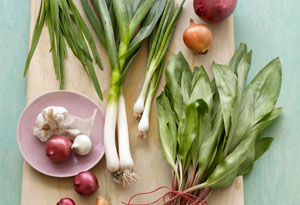State of the Onion

Photo: Petrina Tinslay
So indispensable, yet so hard to love: Onions and their allium kin (shallots, leeks, ramps, chives) have an image problem. We attempt to set it right.
They never turn up on desert island lists, those chronicles of the foods some muckety-muck couldn't live without. But onions and their ilk would be a better choice for a shipwrecked soul than almost any other provision. You can use them to turn the lowliest edibles—marrow bones, minnows, roots, shoots, and leaves—into a range of satisfying foods. Without them, no savory dish tastes quite as good."Next to water and salt, onions are among a cook's most valuable ingredients," says Michael Ruhlman, author of Ratio. Indeed, alliums—the botanical name for the genus that includes onions, leeks, scallions, chives, garlic, and shallots—are an essential ingredient in dishes both plain and fancy the world over. They flavor Indian curries, German sausages, Vietnamese phos, Finnish herring, Chinese dumplings, and Italian risottos. They add sweetness as well as piquancy—a kind of sharp, stinging vitality without which foods would be flat. "We vastly undervalue onions because they're cheap," adds Ruhlman. "If they were expensive, chefs would pay dearly for them."
Nutritionists probably would, too, because onions and their kin are intensely healthful (a notion that still surprises me, having grown up being told that colorful vegetables are the most nutritious). "Onions are one of the richest sources of flavonoids in the human diet," says Rui Hai Liu, associate professor of food science at Cornell University. "Consuming flavonoids—a type of phytochemical plants produce to ward off predators in the wild—is associated with reduced risk of cancer and heart disease. Onion flavonoids are also antibacterial, antiviral, and anti-inflammatory."
All of which means we should now pause to marvel at the accidental wisdom of our cavewoman forebears, some of whom foraged for wild onions, among a handful of plants they ate to survive, according to archaeologists. Just think: If they had eaten French fries or Kit Kat bars instead, our species might have died out.
Instead we evolved, and along the way we used alliums to feed the laborers who built the Pyramids, and sent bagfuls to the afterlife with the pharaohs, proving that even then, these vegetables were valued by rich and poor alike. The Israelites in the Old Testament ate them, as did Greeks who sailed the ancient seas. Those precious alliums, like the ones we eat today, could probably have been divided loosely into two categories: sweet, tender spring varieties like chives, garlic scapes, and ramps, which poke up through the dirt before broad-leafed weeds and shady trees can block out the sun, and fall "storage" onions, which, when dried and cured, last many months.
So why don't we adore alliums? That's easy. They reek. Indeed, they seem to have an almost sadistic need to make us pay—in stinging eyes and fetid breath—for the pleasure of their culinary service. The irritants responsible for this abuse are sulfuric compounds that literally attack nerve endings in your eyes and nose. While it's hard to love such a hyperactive defense system, you can still admire it, because it's as sophisticated as any weapon dreamed up by the Pentagon. Through their roots, alliums absorb sulfur from the soil, which is then stored in cell fluids. They also contain an enzyme, sequestered in a vacuole, or balloonlike sac. Each of these substances is innocuous on its own, but if you combine them, by cutting or biting into a raw onion, say, they become—ack!—a volatile gas. Refrigerating an allium before you chop it can help; it slows the flow of the enzyme activator. Some claim it helps to cut near a flame, which allegedly burns off some of the gas as it escapes into the air. If you plan to use an allium raw—minced shallots in a salad dressing, for example—rinse or soak the bits in water or vinegar for a few minutes first. You'll wash off the sharp, bitter compounds that collect on the cut surfaces.
As for ways to mitigate the bad breath that hangs like a social stigma over anyone who's gone overboard with alliums, eating foods that oxidize (or turn brown) when cut, like apples or basil, can help, though only in the short term. Generally, by the time the allium has entered your digestive system, it's too late to do anything but wait. Of course, if you're smart, you planned ahead and fed alliums to anyone with whom you wish to spend the stinky interlude. If not, you can always head off to a desert island.
 Get the recipes:
Get the recipes:Menu for a fresh spring dinner party



